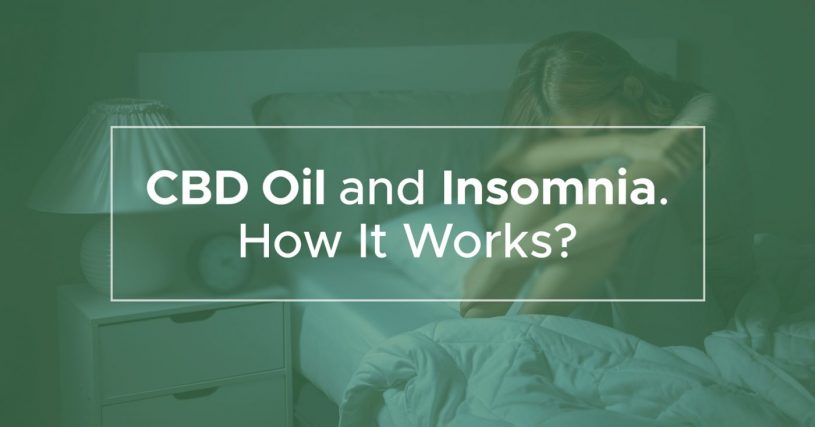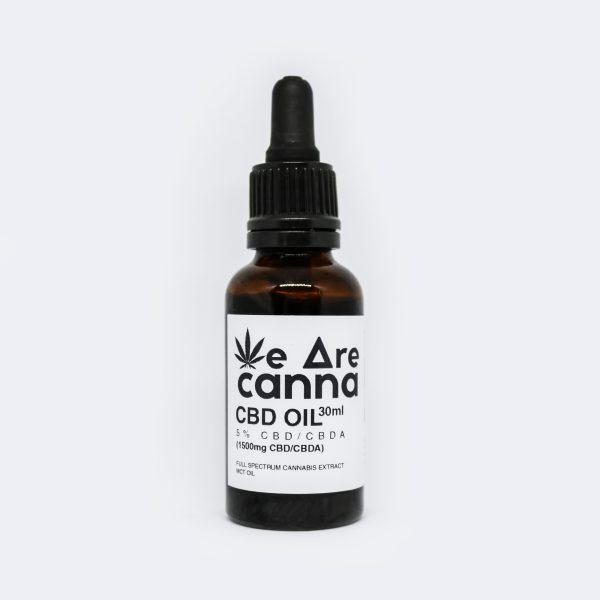Due to the increased interest and popularity of therapeutic benefits of CBD, the market is now flooded with CBD-infused products. Research shows CBD may increase overall sleep amounts and reduce insomnia.
CBD or cannabidiol is one the most researched and talked about cannabinoids of cannabis. It is known to provide health benefits due to its ability to interact with the body’s endocannabinoid system. It can provide health benefits due to the following properties:
- Anxiolytic
- Anti-inflammatory
- Analgesic
- Anticonvulsive
- Antipsychotic
- Immunomodulation
CBD Oil for Insomnia
Had a restless night full of tossing and turning, and you wake up grumpy and tired? It looks like you are not the only one! It turns out that according to a poll in 2020, more than 50% of people around the World experience sleep problems due to poor health or environmental conditions. In this regard, a compound of cannabis called CBD or cannabidiol may help you. While research on its therapeutic benefits is still in its early stages, scientists believe that CBD may help manage Insomnia and other sleep-related problems (Hsiao et al., 2012).
Insomnia and other sleep disorders may occur due to some serious underlying issues such as:
- Mental health problems like depression and anxiety and post-traumatic stress disorder
- Chronic pain and inflammation
- Excess consumption of caffeine
- Medication set to keep the mind alert
A crossover study comparing CBD with nitrazepam found that high-dose CBD at 160 mg increased the duration of sleep. Another crossover study showed that plasma cortisol levels decreased more significantly when given oral CBD, 300 to 600 mg, but these patients experienced a sedative effect. The higher doses of CBD that studies suggest are therapeutic for anxiety, insomnia, and epilepsy may also increase mental sedation.
Cortisol is one of the significant inflammatory markers produced by the body in the day, and its quantity reduces in the night while we sleep. However, patients with insomnia have an increased level of cortisol even at night and it interferes with their sleep.
Research has shown that CBD and other cannabinoids can reduce the expression of this stress hormone (Shannon et al., 2019).
Chronic pain and inflammation are other reasons behind the disturbed sleep-wake cycle. Research has shown that CBD can interact with the endocannabinoid system and alter pain perception by reducing the inflammatory response of the body. It acts as an immunosuppressant and allows the body to heal quickly. CBD can also interact with the TRPV1 receptors that are also meant to process the pain signals (Babson, Sottile and Morabito, 2017).
Anxiety and stress are other significant reasons behind disturbed sleep. Over the counter medications for stress, anxiety, and depression work to improve the serotonin level in the body. Serotonin is the happy hormone that can uplift mood and produce happy feelings. CBD can interact with 5HTV1 serotonin receptors to boost the production and uptake of serotonin (Chagas et al., 2014).
Research Findings
2019 In a study conducted in 2006, 57 of the 72 patients had reduced anxiety symptoms after the first month of CBD use, and 48 had improved sleep quality.
Most study participants received 25 mg of CBD in capsule form. If such CBD did not reduce anxiety, it was increased to 50-75 mg CBD. Consumption was in the morning after breakfast.
If 25 mg CBD did not improve sleep, the amount was increased to 50-75 mg CBD after dinner.
One of the study participants had been diagnosed with schizophrenia. Sleep was found to be improved by higher levels of CBD than other participants. He needed 175 mg of CBD per day.
Based on current scientific data, the effective amount of CBD to improve sleep quality is different for everyone. A lower amount of CBD increases alertness, while a higher amount of calms and relaxes.
Before taking a specific dose for CBD for insomnia, make sure to keep the following things in mind:
- The potential of your favorite product
- The bioavailability of the chosen product type
- The severity of your condition
- Your weight and metabolic rate
- Previous experience with CBD
- Any over the counter medication that you are already taking
References
Babson, K. A., Sottile, J. and Morabito, D. (2017) ‘Cannabis, cannabinoids, and sleep: a review of the literature’, Current psychiatry reports. Springer, 19(4), pp. 1–12.
Chagas, M. H. N. et al. (2014) ‘Cannabidiol can improve complex sleep‐related behaviours associated with rapid eye movement sleep behaviour disorder in Parkinson’s disease patients: a case series’, Journal of clinical pharmacy and therapeutics, 39(5), pp. 564–566.
Hsiao, Y.-T. et al. (2012) ‘Effect of cannabidiol on sleep disruption induced by the repeated combination tests consisting of open field and elevated plus-maze in rats’, Neuropharmacology. Elsevier, 62(1), pp. 373–384.
Shannon, S. et al. (2019) ‘Cannabidiol in anxiety and sleep: a large case series’, The Permanente Journal. Kaiser Permanente, 23.
Our Products
CBD Cannabis Oil in MCT 10 % 3000 mg 30 ml
114.95€ 114.95€Read moreA bottle of CBD Cannabis 10 % 3000 mg CBD 30 ml oil (with a small pipette). Made from certified, hand-picked and organically grown cannabis mixed with coconut oil (MCT) for better absorption of cannabinoids.
This phytocannabinoids extract is a full spectrum extract, professionally made and laboratory-tested to ensure the highest quality and safety.
Discount applies when purchasing more:
CBD Cannabis Oil in MCT 10 % 1000 mg 10 ml
46.59€ 46.59€Add to cartA bottle of CBD Cannabis 10 % 1000 mg CBD 10 ml oil (with a small pipette). Made from certified, hand-picked and organically grown cannabis mixed with coconut oil (MCT) for better absorption of cannabinoids.
This phytocannabinoids extract is a full spectrum extract, professionally made and laboratory-tested to ensure the highest quality and safety.
Discount applies when purchasing more:
CBD Cannabis Oil in MCT 5% 1500 mg 30 ml
68.01€ 68.01€Add to cartA bottle of CBD Cannabis oil (with a small pipette). Made from certified, hand-picked and organically grown cannabis mixed with coconut oil (MCT) for better absorption of cannabinoids.
This phytocannabinoids extract is a full spectrum extract, professionally made and laboratory-tested to ensure the highest quality and safety.
Discount applies when purchasing more:
CBD Capsules 750 mg
51.00€ 51.00€Add to cartHigh-grade CBD / CBDA capsules professionally made and laboratory-tested to ensure the greatest quality and safety.
This product is suitable for those who want to avoid the specific taste of cannabis extracts. Nothing needs to be dosed, we’ve already done it for you.
Discount applies when purchasing more:
Hemp Oil for Pets 250 mg CBD 10 ml (2 bottles)
29.00€ 29.00€Add to cartWe Are Canna full-spectrum CBD oil for pets is a completely natural, excellent source of vitamins and Omega fatty acids.
We all want our pets to be healthy and beautiful. Let’s take care of them by incorporating high-quality CBD products into their daily diet.
CBD soap 100g / 100mg CBD
Original price was: 9.99€.8.99€Current price is: 8.99€. 8.99€Read moreWe Are Canna CBD body soap is another unique, natural, handmade cannabis product made only from the highest quality ingredients, free from GMOs or other harmful substances.
Thanks to the knowledge passed down from generation to generation, the plant that humanity has used for thousands of years and modern technology, we are able to experience what is real, natural, tested and appreciated. CBD soap is made using a 100-year-old manufacturing methodology, which makes this product even more special.
The phytocannabinoids and terpenes in CBD soap, acting in synergy, will give your skin a variety of therapeutic properties, not to mention the pleasant aroma that will captivate everyone. From now on, bathing rituals will be different!






